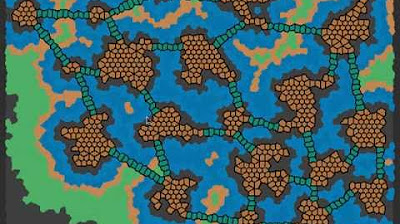How to Stand Out (without getting shot down)
Summary
TLDR这段视频讲述了如何在遵循传统规则的基础上,通过打破常规思维模式,实现创新和突破。导师们分享了自己的经历,比如导演泰卡·怀蒂蒂和音乐制作人里克·鲁宾,他们都是通过先学习掌握规则,然后大胆尝试打破规则,最终创造出独树一帜的作品。视频同时强调,创新不是盲目违背传统,而是在掌握传统的基础上,通过不断探索、实践和迭代,才能真正做出有价值的创新。保持好奇心和勇于尝试的态度,是打破陈旧思维、实现创新的关键所在。
Takeaways
- 👊 生活是可以被塑造和改变的,认识到这一点极为重要。
- 🌟 在社会中突出,而不被边缘化的关键是以正确的方式突出。
- 🎬 塔伊加·维迪提和里克·鲁宾通过打破传统,采用与众不同的方法取得了成功。
- 🔨 创新意味着必须与过去的传统做出明显的断裂。
- 🎵 里克·鲁宾通过打造一种全新的音乐风格,证明了创造力的重要性。
- 📚 创造力需要个体的独立思考,不能简单地复制他人。
- 📈 真正的创新来源于对先驱者的深入学习,而后在此基础上进行突破。
- 🌀 「守破离」是掌握创新的重要过程,从遵循规则到打破规则,再到创造规则。
- 🎤 成功的创新者,如维迪提和鲁宾,能够将他们的独特见解转化为具有深远影响的作品。
- 📖 学习和创新是一个不断的探索过程,通过不断的迭代和专注,可以达到真正的掌握。
Q & A
如何理解生活中的“扎针效应”,即当你对生活采取行动时,生活也会给予你相应的反馈?
-这表明通过个人的努力和行动,我们能够对生活产生影响,改变并塑造它,这是认识到我们能够主动生活而不仅仅是被动接受的关键一步。
在一个规模任何大小的社会中,“突出的钉子总是会被锤下去”的说法如何与创新和改变并存?
-尽管社会常常对不符合常规的行为施加压力,但通过正确的方式突出,例如通过创新和积极的改变,个人仍然可以在不被边缘化的情况下产生影响。
为什么《雷神索尔:诸神黄昏》是一部受到高度评价的电影?
-该电影融合了不寻常的幽默元素,以及导演塔伊卡·维迪提的创新视角,使其成为一部既娱乐又引人思考的作品。
为什么早期的塔伊卡·维迪提没有遵循他的直觉而是听从了传统电影制作的建议?
-维迪提最初被更有经验的传统电影制作者的意见所影响,他们建议他按照特定的方式进行剪辑和制作,而不是遵循自己的创新想法。
瑞克·鲁宾是如何对嘻哈音乐产生重大影响的?
-瑞克·鲁宾通过捕捉纽约俱乐部中嘻哈音乐的原始能量,并将这种感觉带入他的制作中,帮助创造了一种新的嘻哈声音。
哲学家奥修是如何定义创造力的?
-奥修认为创造力是存在中最大的叛逆,强调为了创造,人必须去除一切条件限制,成为一个独立的个体,而不是复制或随大流。
塔伊卡·维迪提和瑞克·鲁宾是如何从他们的前辈那里学习并最终创新的?
-他们开始时严格遵循现有的规则和传统,但随着时间的推移,他们开始进行创新,最终打破常规,创造出原创且具有前瞻性的作品。
什么是“守破离”(Shu-Ha-Ri)?
-守破离是一种日本武道的概念,描述了从遵循规则(守),到突破规则(破),最终达到自由创新(离)的学习和掌握过程。
为什么迭代(iteration)对于软件开发来说非常重要?
-迭代允许开发者不断改进产品,通过重复的改善过程,使产品更接近用户的需求和最终目标。
罗伯特·格林(Robert Greene)如何看待掌握一门技能的过程?
-格林认为掌握技能不是天赋或才华的结果,而是长时间和密集专注于某一知识领域的结果。
Outlines

This section is available to paid users only. Please upgrade to access this part.
Upgrade NowMindmap

This section is available to paid users only. Please upgrade to access this part.
Upgrade NowKeywords

This section is available to paid users only. Please upgrade to access this part.
Upgrade NowHighlights

This section is available to paid users only. Please upgrade to access this part.
Upgrade NowTranscripts

This section is available to paid users only. Please upgrade to access this part.
Upgrade NowBrowse More Related Video

A mental health discovery that could change criminal justice forever | Kim Gorgens | TEDxMileHigh

Graph Grammar based Procedural Generation for a Roguelike

Modern Harmony - Lesson 10: Ravel

【手把手教學】如何用AI做睡前故事,月入1w美金,引流特定用戶 Earn Money With AI By Faceless Kids Bedtime Story Video

It's Everybody's Business | Cold War Era Propaganda Cartoon on Capitalism & Free Enterprise | 1954

【実践済み】1年で差をつける14のルール
5.0 / 5 (0 votes)
